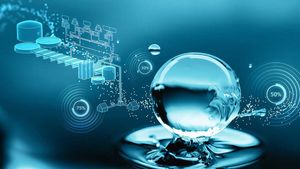2022-03-17
•

That is how I would rephrase Hanlon’s razor.To reverse Hanlon's Razor would be to say, ignorance potentially leads to malice.
When it comes to water or energy conservation, what we find is that most people are not intentionally wasteful.In some cases, the need for conservation of these precious resources has never occurred to them.People know that water is a precious resource, but when it comes to implementing water conserving methods in their own homes and communities, there is a lack of concern.There is apathy, a lack of urgency, all fueled by a seemingly unlimited supply.
You may have access to water due to existing groundwater supply like wells or borewells in your property.It may also be municipal supply or through tankers.If you have the economic conditions, at present in India, you can access water 24 hours a day.However, in your neighborhood itself, things may not be the same.Less than 50 per cent of the population in India has access to safely managed drinking water.Chemical contamination of water, mainly through fluoride and arsenic, is present in 1.96 million dwellings.
In 2020, almost three-quarters (74%) of the world population had access to a safely managed water source.One-in-four people do not have access to safe drinking water.
• Your inadvertent behaviours may cause a lasting impact on people and environment.There are overflowing tanks, open taps, unmanaged leakages, and a general lack of awareness in water conservation.Water, however, is limited.When you waste water, you may be causing a disrupted supply in another part of your city.
• Ground water over-exploitation – Groundwater levels are decreasing across the nation.Groundwater depletion can cause water bodies like lakes and rivers to become shallower.Salinity of groundwater can also increase due to over exploitation, resulting in lack of freshwater availability.
• When you let the untreated domestic and industrial wastewater seep into the ground or into rivers, you are polluting the groundwater and freshwater sources, affecting humans and animals.
• Lack of clean drinking water causes waterborne diseases in many.We are all collectively responsible for the lack of availability of natural resources to all.
Smart water management to tackle the mismanagement and misuse of water is the need of the hour.From water sources to transportation network to the end-user, quality, wastage and use should be assessed and monitored.
We can no longer pretend to have unlimited resources.On a personal, community and government level, measures should be taken to limit our negative impact on the environment and to actively replenish the earth’s freshwater reserves.
• Start at home :- Simple changes can go a long way.Switch off that tap while you brush, take shorter showers, reuse water wherever possible.Monitor your water usage.Fix the leaking pipes in time.
• Rainwater harvesting :- Rainwater harvesting can give you an alternate source of water for use and can also help recharge and replenish groundwater.
• Recycle and reuse :- Recycling use at home/building/locality level eases the pressure on freshwater requirement.Treated water other than sewage can be used for flushing, gardening, farming etc.
• Monitor and Plan :- Water and wastewater should be monitored for quality and quantity at all stages.Water management bodies can plan accordingly as per usage, and prepare for contingency.The safety can also be ensured.Individual uses can monitor usage and save water, energy and money.
References: https://www.unicef.org/india/what-we-do/clean-drinking-water

2024-02-15

2024-01-23